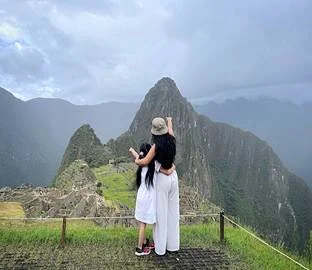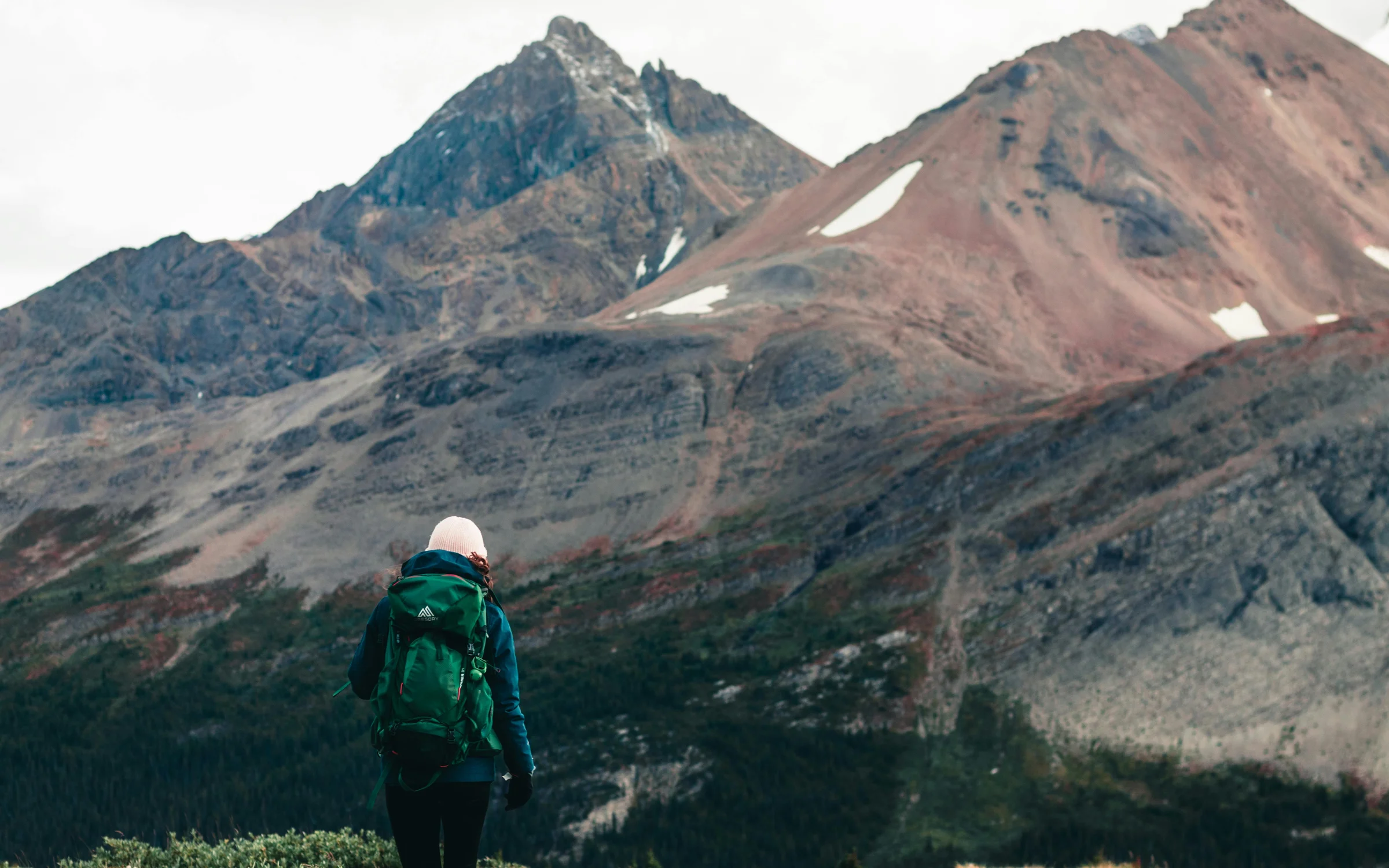
Ausangate Trek Peru: Discover the Sacred Mountains of the Andes | Travel Blog
The Ausangate Trek lies in the heart of the Andes Mountains in the Cusco region of Peru. It’s more than just a trail; it’s an adventure that connects you with ancient cultures and nature’s breathtaking beauty.
Ausangate Mountain is truly special; it is a place where wildlife, nature, and ancient traditions live in perfect harmony. Walking its trails fills you with a deep sense of peace and tranquility at every step.
The distance is approximately 70 km, and the trekkers will travel through various ecosystems. The trek reveals changing landscapes, showcasing towering icy peaks and shimmering lagoons in many colors.
These ecosystems not only shelter many species but also help keep nature in balance through their natural interactions.
There will be an acquaintance with the Andean people who have been there for thousands of years. The interaction with the locals makes one incredibly close to the shepherds and the llama and alpaca herds.
Ausangate is a holy mountain linked to their beliefs and traditions, making the trek into a spiritual experience. You can overcome altitude sickness only by properly acclimatizing to the elevation.
The dry season from May to September is the perfect time for tourists to access this mountain. Consequently, getting the clear skies and good weather is very likely.
Get ready for the next best thing that mixes together adventure, culture, and nature. The Ausangate Trek is proof of the never-ending connection between the Andean people and their mountainous environment.
Table of contents
- The Sacred Heart of the Andes: Ausangate’s Cultural and Spiritual Significance
- Geography and Landscapes: The Ausangate Trail Unveiled
- Planning Your Ausangate Peru Trek: When, How, and What to Expect
- Key Considerations for Planning Your Trek: - Day-by-Day Itinerary: Journey Through the Ausangate Trail
- Day 1: Departure from Cusco to Tinqui
- Day 2: Tinqui to Upis
- Day 3: Upis to Ausangate Base Camp
- Day 4: Ausangate Base Camp to Jampa
- Day 5: Jampa to Pacchanta
- Day 6: Pacchanta to Tinqui, Return to Cusco - Encounters with Andean Life: Communities, Traditions, and Festivals
- Traditional Andean Communities
- Rich Heritage of Festivals
- Experiencing Festivals
- A Deeply Engaging Journey - Wildlife and Biodiversity Along the Ausangate Hike
- Spectacular Fauna
- Diverse Ecosystems
- List of Notable Wildlife:
- Nature's Tranquility - Challenges and Rewards: Altitude, Acclimatization, and Trekking Tips
- Altitude Considerations
- Acclimatization Practices
- Essential Trekking Tips
- Personal Triumphs
- A Lasting Impression - Responsible Trekking: Sustainability and Cultural Respect:
- Preserving Nature
- Cultural Sensitivity
- Tips for Responsible Trekking
- A Shared Responsibility - Practical Guide: Packing, Permits, and Choosing a Trekking Company
- Packing Essentials
- Required Permits
- Customization and Support
- Final Thoughts - Beyond the Trail: Rainbow Mountain and Other Ausangate Extensions
- Rainbow Mountain Adventure
- Other Notable Extensions
- Enriching Your Experience
The Sacred Heart of the Andes: Ausangate’s Cultural and Spiritual Significance
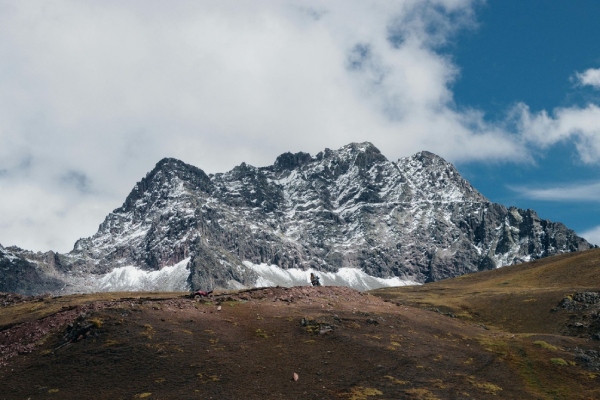
Ausangate stands as the highest mountain in the Peruvian Andes and symbolizes reverence and spirituality. The Quechua people consider this mountain a sacred protector. It reflects the very close relationship between nature and indigenous religions.
People often call the mountain "Apu", meaning a powerful spirit or god. They believe these spirits watch over the communities and the earth. The beliefs around these spirits make the mountain characteristic of the culture of the people in that area.
Regular practices include mountain spirit offerings called "despachos". Such offerings help keep peace and balance between people and Nature.
The annual Qoyllur Rit'i festival, characterized by the convergence of diverse cultures through the blending of their religious practices, is one of the major events associated with Ausangate Mountain. Thousands of pilgrims ascend the mountain, and participate in a ritual that gives a connection between the two different kinds of worship. The event also signifies the revival of cultural values and social ties.
However, the influence of the mountain does not stop at its border. It enriches the ground and supplies water, thus supporting the biodiversity of the area. The interrelationship of land and culture is one of the features of Andean life.
Hikers on the Ausangate Trail witness the mountain’s spiritual world and its magnificent landscape. Guides encourage hikers to respect local customs and participate quietly. The understanding of these customs makes the trekking adventure more valuable and increases the appreciation for the cross-cultural exchange.
Indigenous and scholarly travelers who want to penetrate the holy Abode can enjoy the Ausangate Trek's unmatchable revelations. It is a journey that links up nature's majesty and spiritual zenith.
Geography and Landscapes: The Ausangate Trail Unveiled
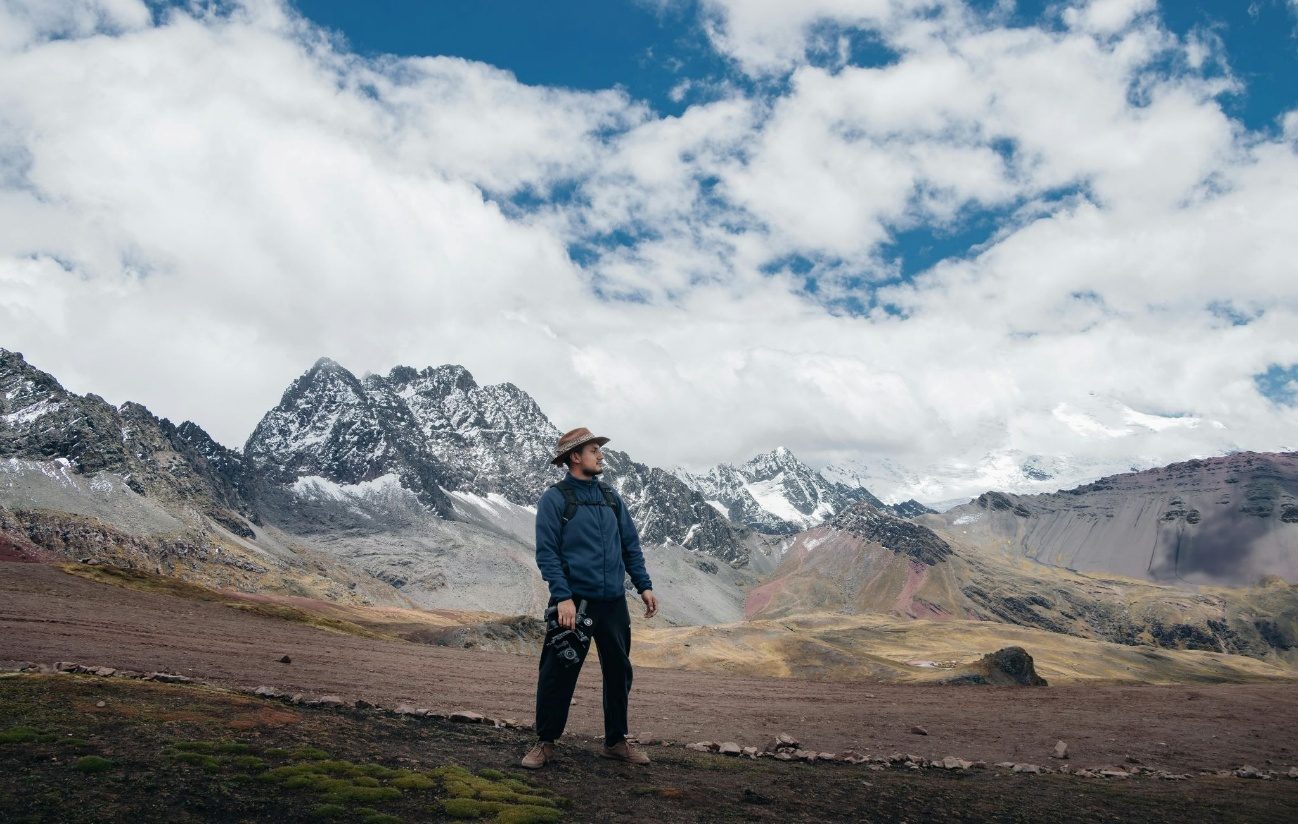
The Ausangate Trail is one of the most picturesque routes in the Andes, winding through the most dramatic terrains. Each step of the way, the hikers see a variety of different landscapes. The undulating valleys capped with snow create a beautiful and dynamic scene in the Andes.
The whole trail is about 70 kilometers long which makes this trail a very nice example of the Andean topography. Hikers go through high-altitude passes and sometimes even higher than 5,000 meters, which really puts their endurance and awe to the test. It’s convenient to carry coca leaves to make somecoca leaf tea to relief the high altitude effects.
Vibrant lakes are there in the valleys to make the mountain scenery even more beautiful and reflect the ever-changing colors of the sky. The lake Sibinacocha and Vinicunca, not only bring a tranquil beauty to the rough harsh environment but also are one of the main features of the landscape. The ancient glaciers still continue to develop and change the surface of the earth by their melting and fracturing process, which is also a main and continuous factor in this ongoing process.
When you take the Ausangate Trail, you are going to get a glimpse of the planet's incredible and truly ancient past. The minerals in the soil and the layers of colored sediments are nature's way of illustrating its geological changes over a very ancient timescale. The Rainbow Mountain Vinicunca has become a worldwide tourist point for views of rich reds, bright turquoises, and glittery golds in the form of stripes.
The trail offers shifting weather, bringing cold mountain winds and warm, sheltered valleys. Quick changes in weather can be difficult even for the most skilled hikers. Thus, good planning and preparation are crucial when moving around the changing conditions.
Hikers on the trail enjoy seeing the many ecosystems that thrive along the route. A wide variety of regions from the barren high-altitude tundra to the fertile grasslands, each having its own unique plant and animal species. This great biodiversity is a testimony to the survival capacity of nature.
Planning Your Ausangate Peru Trek: When, How, and What to Expect
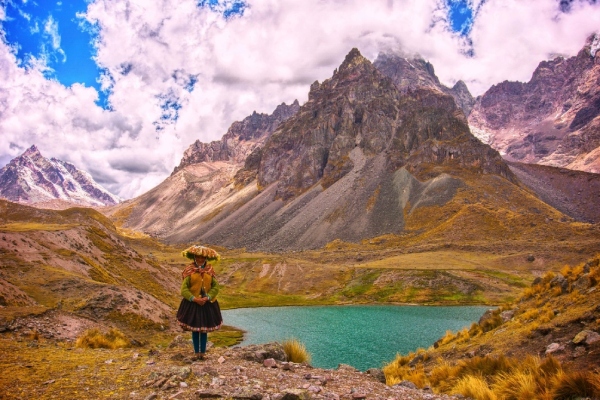
The entire planning of your Ausangate Peru trek is nothing less than a big adventure. One has to go through all the rigorous preparations, mainly due to the high altitudes. The time to take off is one of the most important factors for the success of the whole experience.
The best time to do this trek is the dry season in Peru, from May to September. The months have such good weather that it is usually clear and stable. The dry paths and unobstructed views surely make the trek more pleasant.
Usually, it takes 5-6 days to complete the trek, walking around 70 km in total. It’s a chance to go through unfrequented Andean beauty spots, as you will probably not meet many other trekkers. The remoteness contributes to the intensifying experience.
The travellers have to be ready for the high altitudes, as the peaks of some sections exceed 5,000 meters. Acclimatization is a must to prevent altitude sickness. The traveler can spend a few days in the Sacred Valley , which is near the trek, for acclimatization.
Hire local guides and pack animals, which locals commonly use to carry and transport supplies. They, in fact, make the experience more enjoyable by narrating local culture. Guides provide security and share their rich knowledge about the surroundings.
Be ready for fluctuating weather. The dry season offers clear skies but also brings cold nights. So, comfort is going to depend on layers and good gear.
Key Considerations for Planning Your Trek:
- Season: Dry season (May-September) for optimal conditions.
- Duration: Plan for 5-6 days on the trail.
- Acclimatization: Spend time in Cusco before trekking.
- Guides: Employ local expertise for a richer experience.
- Weather: Pack for both warm days and cold nights.
Proper preparation enhances the trek significantly. Embrace the adventure, knowing you're ready for the challenges and rewards of the Ausangate Trail.
Day-by-Day Itinerary: Journey Through the Ausangate Trail
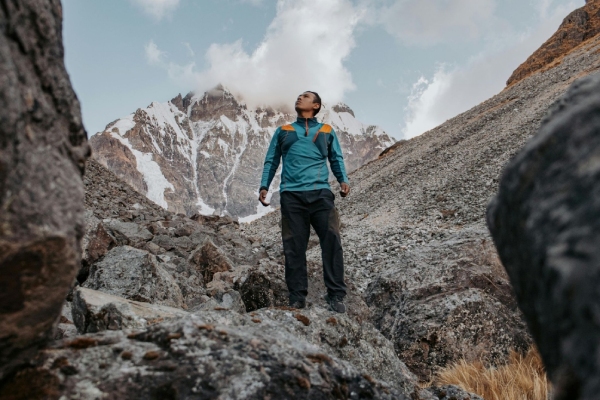
The beginning of the Ausangate trek in Peru is the entry to a marvelous world of incredible flora and fauna and the richness of the Peruvian highlands. The daily adventure on the trail opens up with new mysteries and difficulties.
Day 1: Departure from Cusco to Tinqui
The first day starts with a trip from Cusco to the tiny village of Tinqui by vehicle. The countryside drive showcases rolling hills and divides sloping fields and charming villages with winding ditches. Trekkers often sleep on village floors to escape the city’s hustle and enjoy the peaceful silence of rural life.
Day 2: Tinqui to Upis
The second day of trekking leads you from Tinqui to Upis. The trip will take you through the open puna, an elevation that gives a panoramic view of the Andes mountains. At Upis, famous for its hot springs, the day ends with a refreshing bath in the hot springs. Pitch your tent here next to the hot springs and enjoy the soak.
Day 3: Upis to Ausangate Base Camp
The hike today takes us to the Ausangate Base Camp. When trekking along the Ausangate mountain, the impressive glacier views are literally a sight to behold. The path goes up the Arapa Pass which has an altitude of more than 4,800 meters.
Day 4: Ausangate Base Camp to Jampa
The tour from Camp Ausangate to Jampa passes through various landscapes. The hike is challenging but at the same time, one can see the stunning beauty of the Andes’ colorful and varied geological layers, contoured with occasional silent lakes. Jampa is a quiet stop for you to recover.
Day 5: Jampa to Pacchanta
On this day, the group moves through gentle hills and local herders. Meeting Andean herders opens your eyes and connects you to their rich culture. Reaching Pacchanta, where one can again indulge in the hot springs, is the highlight of the day.
Day 6: Pacchanta to Tinqui, Return to Cusco
The final trekking day leads back to Tinqui, completing the loop. Reflect on the journey’s beauty before making the return drive to Cusco. The diverse landscapes and rich culture you've experienced leave a lasting impression. Completing the perfect family adventure tour.
Encounters with Andean Life: Communities, Traditions, and Festivals
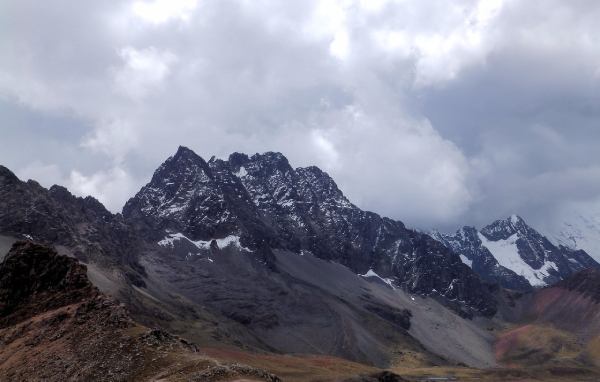
The Ausangate trek in Peru is more than a journey through stunning landscapes; it’s an encounter with Andean life. The trail passes through remote communities where ancient traditions endure.
Traditional Andean Communities
By taking a walk in the villages, tourists get to see the typical adobe houses along with colorful and hand-woven cloth-wearing people. The Quechua people with their distinctive culture give the tourists a wide range of life based on the centuries-old traditions throughout the day.
Cultural Interactions
The locals have been able to communicate with the tourists and have come to know about their pasture and crop growing by making a living. Sharing a meal or participating in a performance of a traditional ritual adds not only to the trekking but most of all it brings the knowledge of the natives' lifestyle.
Rich Heritage of Festivals
The Ausangate region is home to some cultural festivals. Indigenous and Christian traditions blend in these festivals, filling them with vibrant costumes, dancing, and songs. The Qoyllur Rit'i pilgrimage, linked to Ausangate, attracts thousands of people every year.
Experiencing Festivals
Witnessing a festival lets you truly appreciate the Andean spirit. Participating in the collective celebrations, trekkers have a rich experience of the spiritual meaning that Ausangate has to the locals.
A Deeply Engaging Journey
The whole hike brought together the different elements of nature and made the trek itself a bit more modern. These often-overlooked elements bring travelers closer to local people and their cultures, revealing timeless traditions and legacies.
By integrating these factors, the Ausangate experience becomes more of a cultural uncovering than a physical one. These factors also add the most precious layer to the mountain adventure.
Wildlife and Biodiversity Along the Ausangate Hike
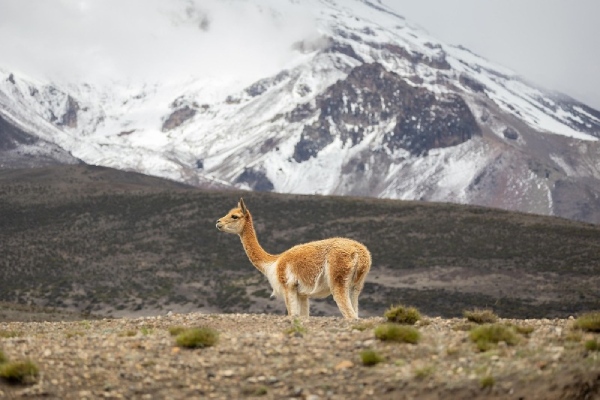
The Ausangate hike in Peru is a marvelous nature trip, exhibiting the incredible diversity of life. Nature has selected this mighty mountain range as its home for diverse wildlife and culture.
Spectacular Fauna
Graceful vicuñas live in this area, grazing on tender high-mountain plants, and locals highly value their soft wool.
Diverse Ecosystems
The higher you go, the more different ecosystems you pass through. Various plants thrive across glaciers, valleys, and green pastures. These ecosystems not only shelter many species but also help keep nature in balance through their natural interactions.
List of Notable Wildlife:
- Andean Condors: Recognizable by their large wingspans.
- Vicuñas: Known for their fine, soft wool.
- Andean Tinamous: Ground-dwelling birds native to the region.
Nature's Tranquility
The silence of the trail, punctuated by the calls of native birds, offers peace and reflection. This undisturbed environment highlights the resilience of life in the high altitudes of the Andes. The journey invites trekkers to appreciate the intricate connections between the landscape and its inhabitants. Between stunning biodiversity, the Ausangate trail gives us an inspiring call for conservation and respect for these delicate ecosystems.
Challenges and Rewards: Altitude, Acclimatization, and Trekking Tips
The Ausangate Trek presents both challenges and rewards. Its high-altitude peaks and remote beauty draw adventurers worldwide to this Peru Treasure.
Altitude Considerations
Altitude is the most important factor that you must prepare for. The trek reaches over 5,000 meters, so proper acclimatization is essential to prevent altitude sickness. The symptoms may be headache and dizziness so it is advisable to gradually expose yourself to the environment.
Acclimatization Practices
You can choose to stay a few days in Cusco before the Ausangate trek. This is a way of helping your body to get used to the low oxygen levels. Drinking plenty of water and refraining from alcohol consumption are other ways of helping your body to adjust.
Essential Trekking Tips
An Ausangate hike tests endurance and rewards with breathtaking vistas. Preparation is important, so keep these tips in mind:
- Stay Hydrated: Drink plenty of water, especially at high altitudes.
- Pace Yourself: Walk steadily to conserve energy.
- Layer Clothing: Temperatures vary, so dress in layers.
Personal Triumphs
Going through the Ausangate trek is a personal victory. The feeling of winning at each peak is unmatched. The views and cultural experiences are the rewards of the mountain trail challenges.
A Lasting Impression
The experience leaves trekkers with a deeper appreciation for the Andes’ natural beauty. Memories of the trek, from serene mountain lakes to towering glaciers, linger long after the journey ends. Each step offers a connection to the land’s spiritual and physical marvels, so get the best Peru Travel Package and start your journey.
Responsible Trekking: Sustainability and Cultural Respect:
Preserving Nature
Minimizing environmental impact is crucial. Stay on designated paths to protect the landscape and native vegetation. Leave no trace by packing out all trash, ensuring the pristine beauty remains for future generations.
Cultural Sensitivity
Engaging respectfully with local communities enhances your trek. The Andean people value their traditions deeply. Understanding and honoring these customs enriches the experience.
Tips for Responsible Trekking
Adopting sustainable practices on the trail is beneficial. Here are some key actions:
- Use Refillable Water Bottles: Reduce plastic waste by carrying a reusable bottle.
- Support Local Guides: Hiring local guides aids the community economically and culturally.
- Respect Wildlife: Observe animals from a distance, ensuring their habitats are undisturbed.
- Travel insurance: It is not obligatory, but it is necessary.
A Shared Responsibility
Responsible trekking is a shared duty. It ensures the sacred landscapes and cultural heritage of Ausangate continue to inspire. By following sustainable practices, trekkers contribute to preserving this remarkable Andean legacy.
Practical Guide: Packing, Permits, and Choosing a Trekking Company
Preparation is vital for a successful Ausangate trek. Packing list Peru properly, securing permits, and selecting a reputable trekking company are key steps.
Packing Essentials
Getting the right gear will make your adventure much more comfortable and safe. The weather can change quickly, so layering your clothing is key. Be sure to bring thermal clothes, a waterproof jacket, and sturdy boots to stay warm and dry.
If you’re trekking on your own, a lightweight tent can be a game-changer, offering both flexibility and comfort. And don’t forget a sleeping bag rated for sub-zero temperatures, it will keep you cozy even on the coldest nights.
Required Permits
You don’t need a special permit for the Ausangate Trail, but some nearby protected areas might require one. It’s a good idea to check with local authorities or your trekking company before you go.
Tourism offices in Cusco offer information and can guide you through any new rules to ensure a smooth trek.
Customization and Support
Many companies offer customizable itineraries to suit personal preferences. This flexibility allows you to tailor the trek to your interests and fitness level.
Final Thoughts
Preparedness makes all the difference on this multi-day trek. Research, pack wisely, and choose partners carefully. Your journey through the Andes will be safer and more enjoyable.
Beyond the Trail: Rainbow Mountain and Other Ausangate Extensions
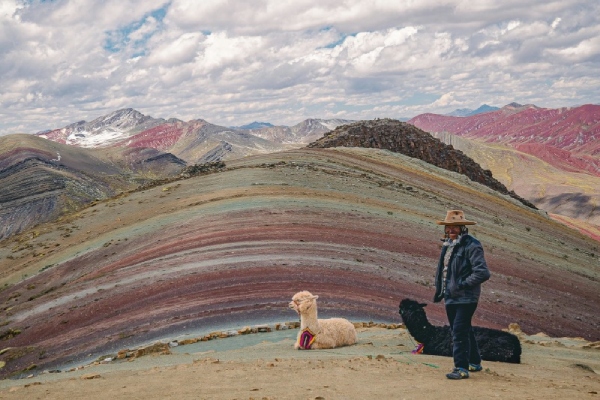
The Ausangate Trek is more than just a pathway through the Andes. It serves as a gateway to remarkable extensions and side trips, enriching your adventure further.
Rainbow Mountain Adventure
One of the most famed side excursions is to the Rainbow Mountains, or Vinicunca. Known for its striking, colorful striations, it's an unmissable sight. The mountain's vibrant hues are due to mineral deposits, creating a natural wonder that captivates trekkers.
This alternative requires an additional day, but the breathtaking panorama is worth every step. Prepare for crowds, as its popularity has surged in recent years.
Other Notable Extensions
Beyond Rainbow Mountain, consider exploring these sites:
- Sibinacocha Lake: A large high-altitude lake with stunning vistas.
- Qampa Mountain: Offers challenging climbs with rewarding views.
- Qoyllur Rit'i Festival: Experience this vibrant spiritual gathering if your timing aligns.
Enriching Your Experience
These extensions provide deeper interactions with the region's diverse ecosystems and cultures. They transform your trek into a more comprehensive exploration of the Andes.
Planning adequately for these extensions ensures you maximize your journey. Local guides can enhance these side trips with cultural insights and logistical support.
The Ausangate Trek is a perfect example of the close relationship between nature and culture. This trek leads you through stunning Andean landscapes and rich cultural sites. With every step, you connect to the Andean universe and hear echoes of ancient civilizations.
This journey offers more than stunning views: it’s a chance to deeply appreciate the rich culture that thrives in these sacred mountains. Walking on these lands makes you part of the story shaped by nature and humankind.
Taking both the difficulties and the benefits, the trek makes an unforgettable impression. The-hearted Ausangate's spirit comes to you and remains with you for a long time after you leave. Its persistent presence makes one think of and show reverence for the glorious Andes.
Check Our Suggested Tours:
- The Soul of Two Worlds: A Grand Amazon & Andes Expedition 14d/13n
- Family Adventure Tour
- Sacred Valley's uphill ascent to the Machu Picchu adventure
- Following the Path to the Sacred Sun Gate
- Peru By Belmond Tour
- From the Heart of the Jungle to the Sacred Mountain: A Luxury Expedition Through the Amazon & Ausangate 16d/15n
